Brunei is known for its diverse range of animal and plant species, making it a hub of biodiversity in Southeast Asia. This small country on the northwest coast of Borneo boasts a rich ecosystem, with tropical evergreen rainforests, mangroves, coral reefs, and peat swamp forests. It is home to an estimated 15,000 species of vascular plants and 2,000 species of trees.
Among the unique species found in Brunei are the proboscis monkey and the ground squirrel. Additionally, there are two crocodile species and diverse freshwater species. However, Brunei’s biodiversity faces numerous threats. Land development, pollution, encroachment, climate change, and invasive alien species all pose significant challenges.
Human activities also contribute to biodiversity loss in Brunei. Unsustainable harvesting and poaching have a detrimental impact on the ecosystem. Development projects and forest fires further endanger the natural environment.
Key Takeaways:
- Brunei is home to a diverse range of animal and plant species.
- The proboscis monkey and ground squirrel are unique endemic species found in Brunei.
- Threats to Brunei’s biodiversity include land development, pollution, encroachment, climate change, and invasive alien species.
- Unsustainable harvesting and poaching contribute to biodiversity loss in Brunei.
- Efforts are being made to protect and conserve biodiversity through the establishment of forest reserves and marine protected areas.
The Flora and Fauna of Brunei
Brunei’s ecosystem boasts a wide array of flora and fauna, ranging from tropical evergreen rainforests to coral reefs. With its diverse habitat, the country is home to approximately 15,000 species of vascular plants and 2,000 species of trees. This rich plant life supports a thriving ecosystem where a variety of animal species thrive.
The fauna in Brunei is equally remarkable. The country is known for its endemic species, such as the proboscis monkey and the ground squirrel. These unique animals can only be found in Brunei, making them a symbol of the country’s biodiversity. Brunei also houses two crocodile species and a wide range of freshwater species, including fish and crustaceans.
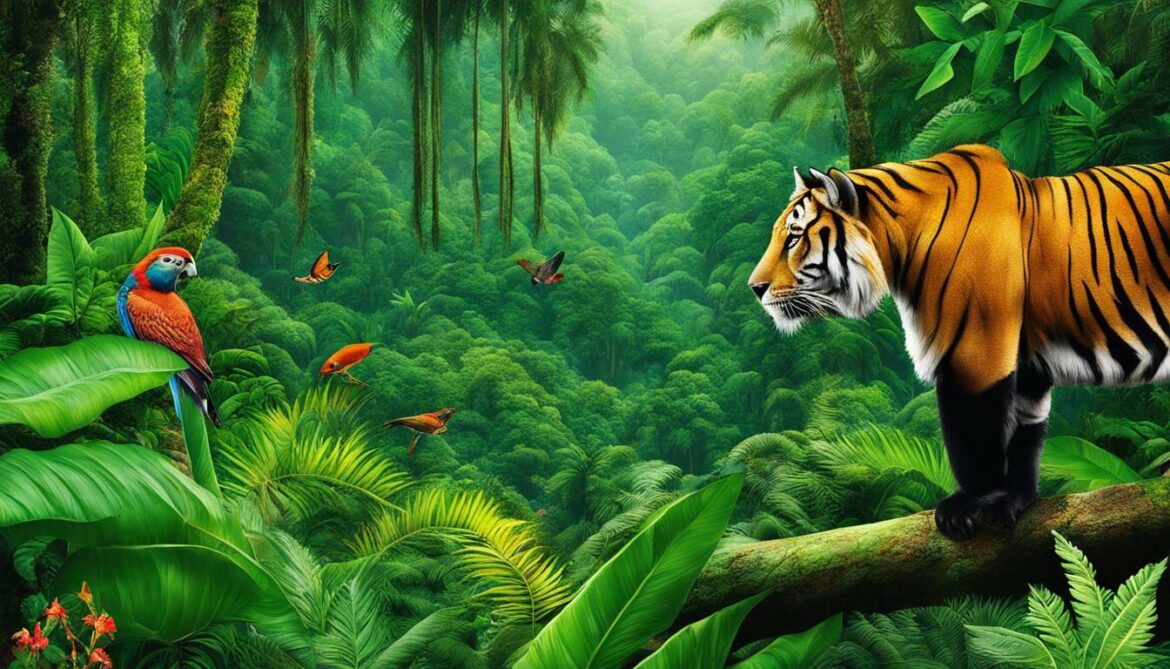
However, despite its natural wealth, Brunei’s biodiversity is under threat. Land development, pollution, encroachment, climate change, and invasive alien species pose significant challenges to the delicate balance of the ecosystem. Human activities, such as unsustainable harvesting and poaching, further contribute to the loss of biodiversity. Development projects and forest fires also endanger unique natural environments, disrupting the delicate web of life in Brunei.
In response to these threats, significant efforts are being made to protect and conserve biodiversity in Brunei. The government has established forest reserves and marine protected areas to safeguard critical habitats. These areas serve as sanctuaries for endangered species and provide a safe haven for their survival. Brunei is also actively implementing the National Biodiversity Strategy and Action Plan, aligning itself with the global target of the Aichi Biodiversity Targets by 2020.
Additionally, Brunei aims to raise awareness, foster cooperation, and integrate biodiversity conservation into national development plans. By utilizing its biological resources for sustainable economic growth, Brunei seeks to reduce its dependence on the oil and gas industry while safeguarding its natural heritage for future generations.
Endemic Species in Brunei
Brunei is home to several rare and endemic species, such as the proboscis monkey and the ground squirrel. These unique creatures have adapted to the country’s diverse ecosystems, making them an important part of Brunei’s rich biodiversity.
The proboscis monkey, also known as the long-nosed monkey, is an iconic species found only in Borneo, including Brunei. With its distinctively large nose and potbelly, it captures the imagination of locals and visitors alike. These monkeys are primarily arboreal and inhabit the forests and mangroves of Brunei. However, habitat loss and hunting pose significant threats to their survival.
Another endemic species found in Brunei is the ground squirrel. These small rodents are known for their agility and ability to thrive in various habitats. Brunei’s forests provide the perfect home for these squirrels, where they play a vital role in seed dispersal and maintaining the balance of the ecosystem. Unfortunately, deforestation and land conversion for agricultural purposes jeopardize their habitat.
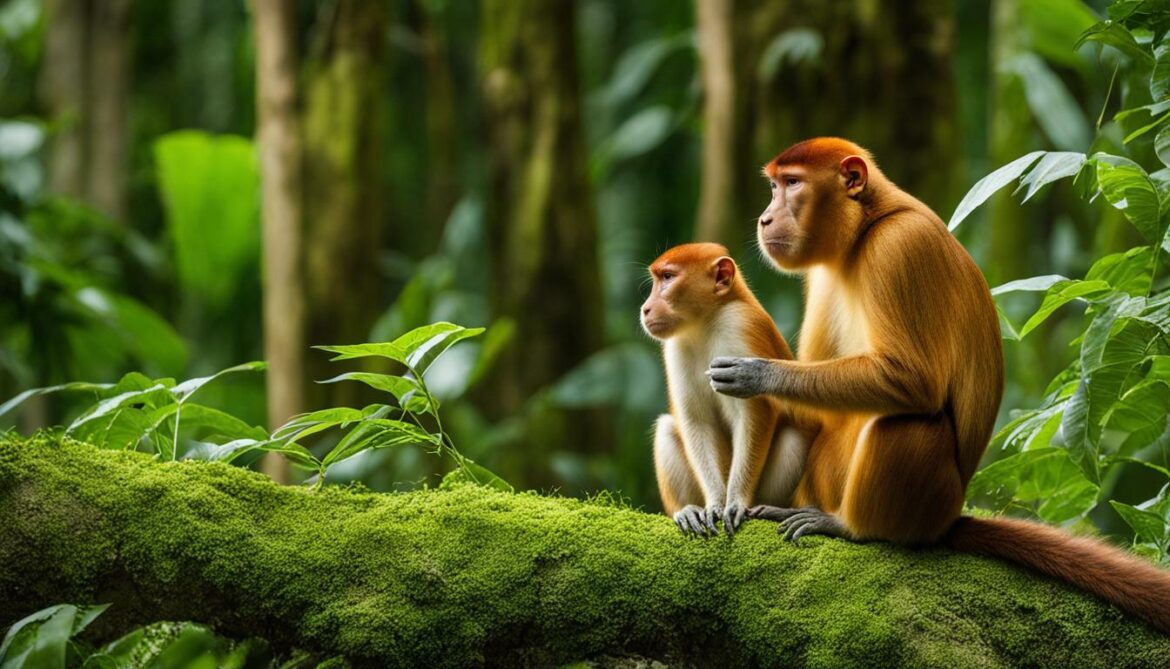
The protection of these endemic species is crucial for maintaining Brunei’s unique biodiversity. Efforts are being made to conserve their habitats through the establishment of protected areas and the implementation of strict regulations against hunting and illegal wildlife trade. However, continued awareness and conservation initiatives are necessary to ensure the long-term survival of these remarkable species.
| Endemic Species |
Status |
Threats |
| Proboscis Monkey |
Endangered |
Habitat loss, hunting |
| Ground Squirrel |
Vulnerable |
Deforestation, land conversion |
Threats to Brunei’s Biodiversity
Sadly, Brunei’s biodiversity is under threat from activities such as land development, pollution, encroachment, climate change, and invasive alien species. The rapid pace of land development for infrastructure projects and agricultural expansion has resulted in the clearance of large areas of natural habitats, leading to habitat fragmentation and loss. This destruction of ecosystems disrupts the delicate balance of biodiversity, as many species depend on specific habitats for their survival.
Pollution, particularly from industrial activities and urbanization, also poses a significant threat to Brunei’s biodiversity. The release of pollutants into the air, land, and water negatively impacts the health of plants and animals. In addition, pollution can lead to the degradation of water bodies and coral reefs, affecting the diverse marine life that Brunei is blessed with.
Encroachment, which refers to the invasion of human activities into natural habitats, further exacerbates the loss of biodiversity. As human populations expand and encroach upon natural areas, it disrupts the natural balance and threatens the survival of many species. Activities such as deforestation, agriculture, and infrastructure development encroach upon wildlife habitats and disrupt their reproductive and survival patterns.
Invasive alien species are another significant threat to Brunei’s biodiversity. These species, often introduced unintentionally by human activities, can outcompete native species, disrupt ecosystems, and cause the decline or extinction of indigenous plants and animals.
To address these threats, it is essential to adopt sustainable practices and implement effective conservation strategies. This includes prioritizing the protection of habitats, promoting environmental awareness, and enforcing regulations to prevent further degradation. The establishment of forest reserves and marine protected areas plays a vital role in safeguarding biodiversity. By preserving these areas, Brunei can protect its unique ecosystems and the species that depend on them.
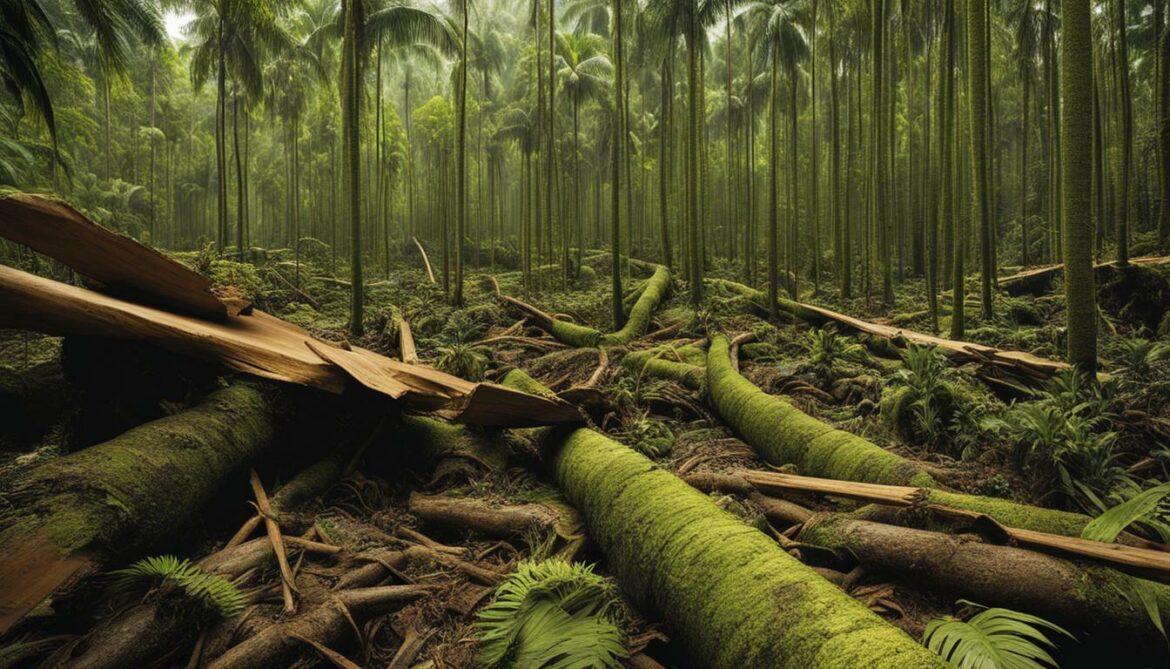
Brunei’s rich biodiversity is facing numerous threats, including land development, pollution, encroachment, climate change, and invasive alien species. These activities lead to habitat destruction, species loss, and ecosystem disruption. To combat these threats, sustainable practices, conservation efforts, and the establishment of protected areas are necessary. It is vital that Brunei continues its commitment to conserving its biodiversity for the benefit of present and future generations.
Human Impact on Biodiversity in Brunei
Human activities, including unsustainable harvesting and poaching, contribute to the loss of biodiversity in Brunei. The rich and diverse ecosystem of Brunei is under constant threat from these destructive practices. Unsustainable harvesting, such as overfishing and excessive logging, disrupts the delicate balance of the ecosystem, leading to the decline of various plant and animal species.
Poaching, particularly of endangered species, is another significant threat to Brunei’s biodiversity. Illegal hunting puts immense pressure on vulnerable populations and can push them to the brink of extinction. Poachers target iconic species like the proboscis monkey, prized for their unique characteristics and rarity.
To address these challenges, Brunei has implemented measures to combat unsustainable harvesting and poaching, including stringent regulations, increased surveillance, and conservation programs. These initiatives aim to protect vulnerable species and preserve their natural habitats, ensuring the long-term sustainability of Brunei’s rich biodiversity.
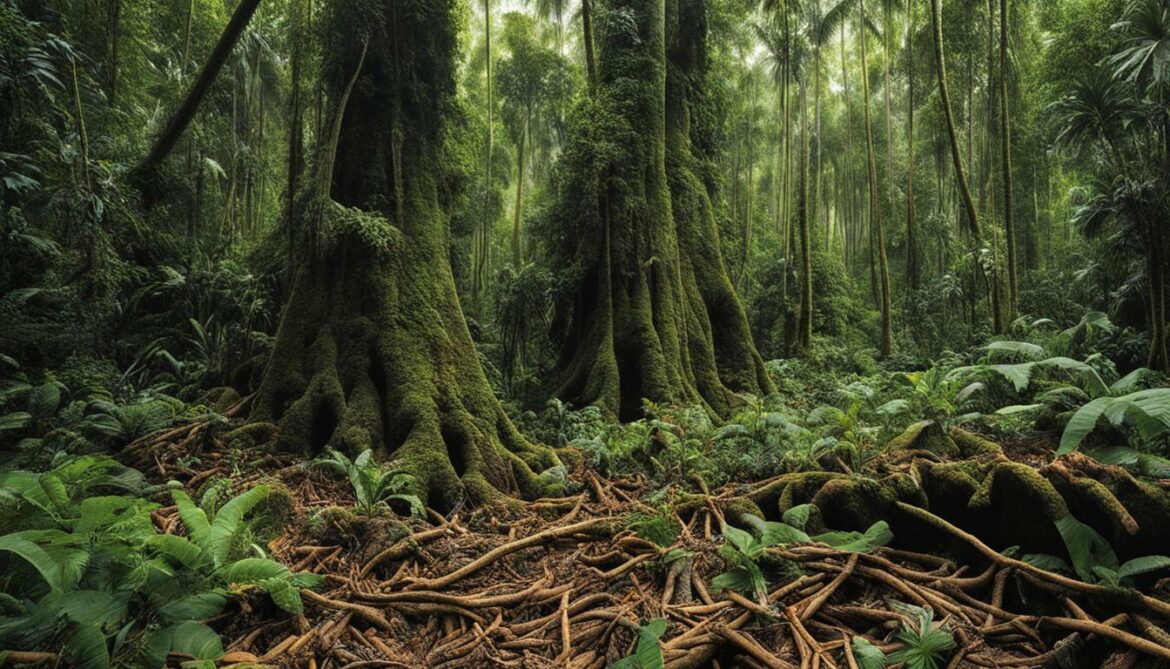
One of the key strategies in tackling the human impact on biodiversity is protecting endangered species. Brunei has established protected areas and conservation programs specifically designed to safeguard vulnerable species. These efforts include habitat restoration, captive breeding, and community engagement to raise awareness about the importance of conserving Brunei’s unique wildlife.
| Threats to Biodiversity |
Examples |
| Unsustainable harvesting |
Overfishing, excessive logging |
| Poaching |
Illegal hunting of proboscis monkeys |
| Land development |
Expansion of infrastructure and agriculture |
| Pollution |
Industrial waste, chemical runoff |
| Encroachment |
Human settlement into protected areas |
| Climate change |
Rising temperatures, changing rainfall patterns |
| Invasive alien species |
Non-native plants and animals disrupting ecosystems |
Conservation Efforts in Brunei
Recognizing the importance of biodiversity conservation, Brunei has implemented various initiatives to protect its natural resources. The government, together with local communities and international partners, is committed to preserving the rich biodiversity found within the country’s diverse ecosystems.
One of the key efforts in biodiversity conservation is the establishment of forest reserves and marine protected areas. These designated areas play a crucial role in safeguarding the habitats of numerous plant and animal species. Brunei has set aside vast tracts of land for forest reserves, ensuring the preservation of critical ecosystems such as tropical rainforests and peat swamp forests.
Furthermore, the government has developed the National Biodiversity Strategy and Action Plan, outlining specific goals and targets to address biodiversity loss. This strategic plan aligns with the global Aichi Biodiversity Targets, striving to protect and restore ecosystems, combat invasive species, and promote sustainable land use practices.
Efforts to Raise Awareness and Promote Cooperation
Besides conservation measures, Brunei places great importance on raising public awareness about the significance of biodiversity. Various campaigns, educational programs, and events are organized to engage the local community in conservation efforts. These initiatives aim to foster a sense of stewardship and encourage individuals to take action to protect their natural heritage.
Additionally, Brunei actively collaborates with international organizations, neighboring countries, and regional initiatives to promote cooperation in biodiversity conservation. By sharing knowledge, expertise, and resources, Brunei seeks to achieve common goals in safeguarding biodiversity and creating a sustainable future for generations to come.
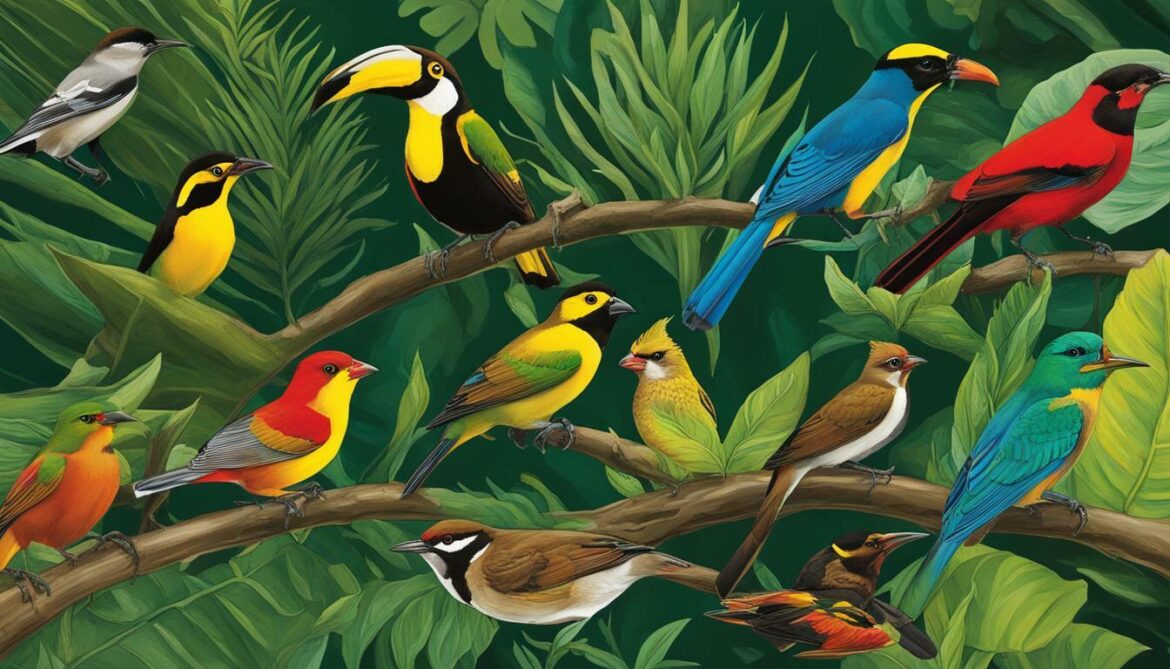
In conclusion, Brunei’s commitment to biodiversity conservation is evident through its comprehensive conservation efforts. By establishing protected areas, implementing strategic plans, raising awareness, and fostering international cooperation, Brunei is striving to conserve its unique and valuable natural resources. With continued dedication, the nation aims to ensure the long-term sustainability and preservation of its rich biodiversity.
Forest Reserves and Marine Protected Areas
To safeguard Brunei’s biodiversity, the government has created forest reserves and marine protected areas. These areas serve as crucial habitats for a wide range of plant and animal species, ensuring their survival and promoting the conservation of Brunei’s unique ecosystems.
The forest reserves in Brunei cover a significant portion of the country’s land area, providing refuge for diverse flora and fauna. These protected areas are home to rare and endangered species, including the proboscis monkey and various bird species. Within the forest reserves, strict regulations are in place to limit human activities and prevent habitat destruction.
Similarly, Brunei has established marine protected areas to conserve its rich marine biodiversity. These areas encompass coral reefs, seagrass meadows, and other important marine ecosystems. By implementing strict fishing regulations and monitoring activities, Brunei aims to protect its marine species and preserve the health of its coastal ecosystems.
These efforts to create forest reserves and marine protected areas highlight Brunei’s commitment to biodiversity conservation. By preserving these natural habitats, Brunei ensures the long-term survival of its unique and valuable plant and animal species, fostering a sustainable future for its rich biodiversity.
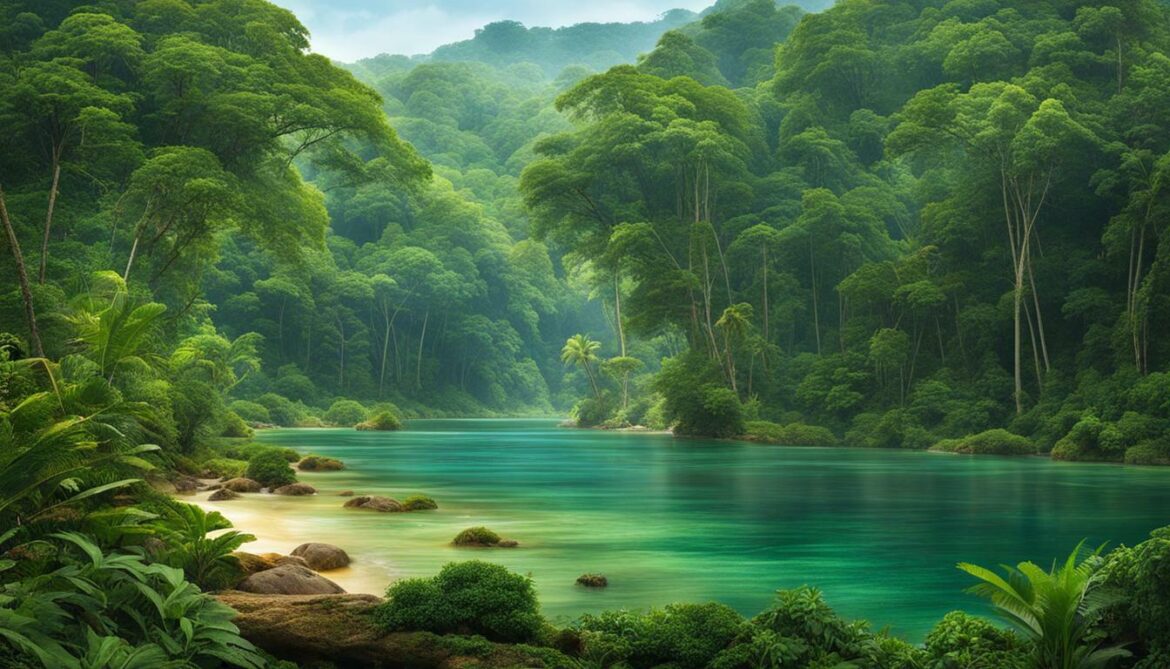
| Forest Reserves |
Location |
| Ulu Temburong National Park |
Temburong District |
| Tasek Merimbun Heritage Park |
Tutong District |
| Andulau Forest Reserve |
Belait District |
National Biodiversity Strategy and Action Plan
Brunei has developed a comprehensive National Biodiversity Strategy and Action Plan to guide its conservation efforts and meet the Aichi Biodiversity Targets. This strategic plan outlines the country’s commitment to preserving its rich biodiversity and ensuring its sustainable management for future generations.
The National Biodiversity Strategy and Action Plan focuses on several key areas, including the protection of critical habitats, the preservation of endangered species, and the promotion of sustainable land and resource management. Through this plan, Brunei aims to enhance biodiversity conservation, strengthen ecosystem resilience, and promote public participation in conservation efforts.
In line with the Aichi Biodiversity Targets established by the Convention on Biological Diversity, Brunei is actively working towards achieving these goals by 2020. These targets include the conservation of a significant portion of terrestrial and marine areas, the integration of biodiversity values into national and local planning, and the implementation of sustainable practices across various sectors.
| Key Components of the National Biodiversity Strategy and Action Plan: |
| 1. Conservation of critical habitats and ecosystems. |
| 2. Protection and recovery of endangered species. |
| 3. Sustainable land and resource management. |
| 4. Integration of biodiversity into national and local planning. |
| 5. Promotion of public participation and awareness. |
By prioritizing these components, Brunei aims to safeguard its unique flora and fauna, preserve its natural heritage, and ensure the long-term sustainability of its ecosystems. The government, in collaboration with various stakeholders, continues to implement initiatives and programs that support the National Biodiversity Strategy and Action Plan, fostering a collective effort towards biodiversity conservation in the country.
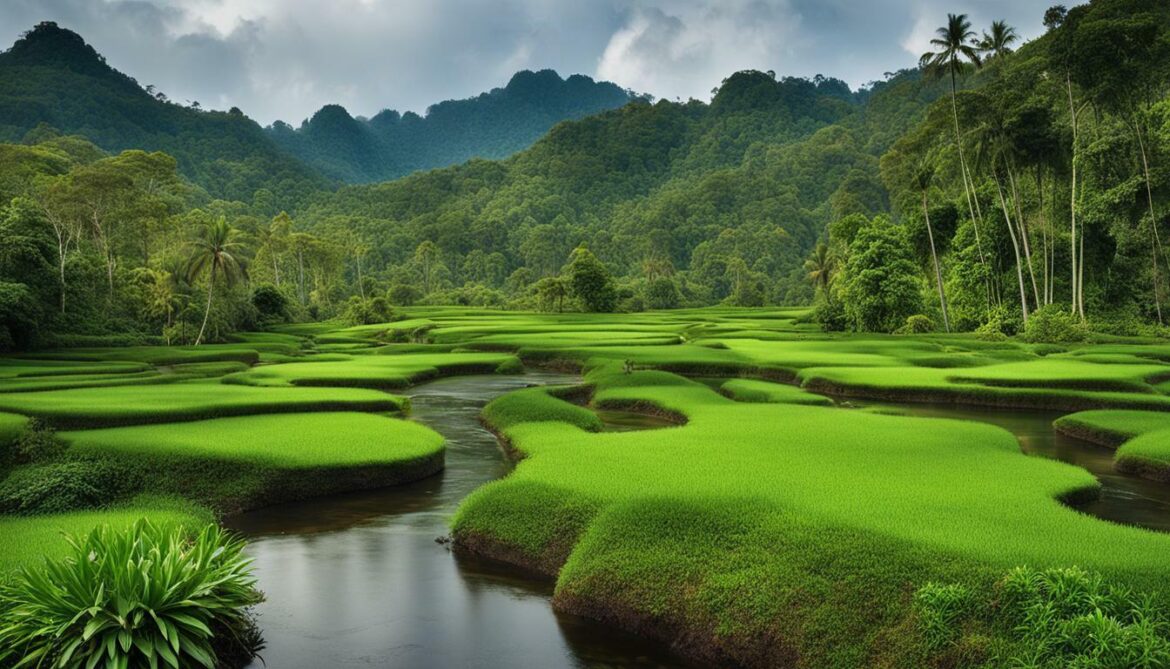
Integrating Biodiversity Conservation into National Development Plans
Brunei recognizes the need to harmonize biodiversity conservation with its national development plans for sustainable progress. The country’s rich biodiversity is a valuable asset that needs to be preserved for future generations. As part of its commitment to biodiversity conservation, Brunei has taken steps to integrate conservation efforts into its national development plans.
Brunei acknowledges that sustainable development must go hand in hand with the protection and preservation of its natural resources. The government has implemented policies and initiatives aimed at balancing economic growth and environmental sustainability. Through the integration of biodiversity conservation into national development plans, Brunei aims to ensure that economic progress is achieved without compromising its unique ecosystems and species.
One of the key strategies is the establishment of protected areas, such as forest reserves and marine protected areas. These areas serve as havens for endangered species and provide essential habitats for a wide range of flora and fauna. By designating these protected areas, Brunei aims to safeguard its biodiversity hotspots and ensure their long-term survival.
In addition to protected areas, Brunei is actively working towards implementing the National Biodiversity Strategy and Action Plan. This plan sets out specific goals and targets to enhance biodiversity conservation and sustainable development. It includes measures to address the main threats to biodiversity, such as land development, pollution, climate change, and invasive species.
| Key Points: |
| – Brunei recognizes the importance of integrating biodiversity conservation into national development plans for sustainable progress. |
| – Protected areas, such as forest reserves and marine protected areas, are established to preserve endangered species and vital habitats. |
| – The National Biodiversity Strategy and Action Plan outlines specific goals and measures to address threats to biodiversity. |
“Protecting our biodiversity is not just a moral responsibility, but also a crucial step towards ensuring sustainable development for Brunei. By integrating biodiversity conservation into our national development plans, we can strike a balance between economic growth and environmental preservation, creating a harmonious future for our country.”
– Minister of Environment, Brunei
Brunei’s commitment to integrating biodiversity conservation into national development plans highlights the country’s dedication to sustainable progress. By prioritizing the preservation of its natural heritage, Brunei sets an example for other nations to follow. Through continued efforts, collaboration with international organizations, and the active participation of its citizens, Brunei aims to secure a bright and biodiverse future for generations to come.
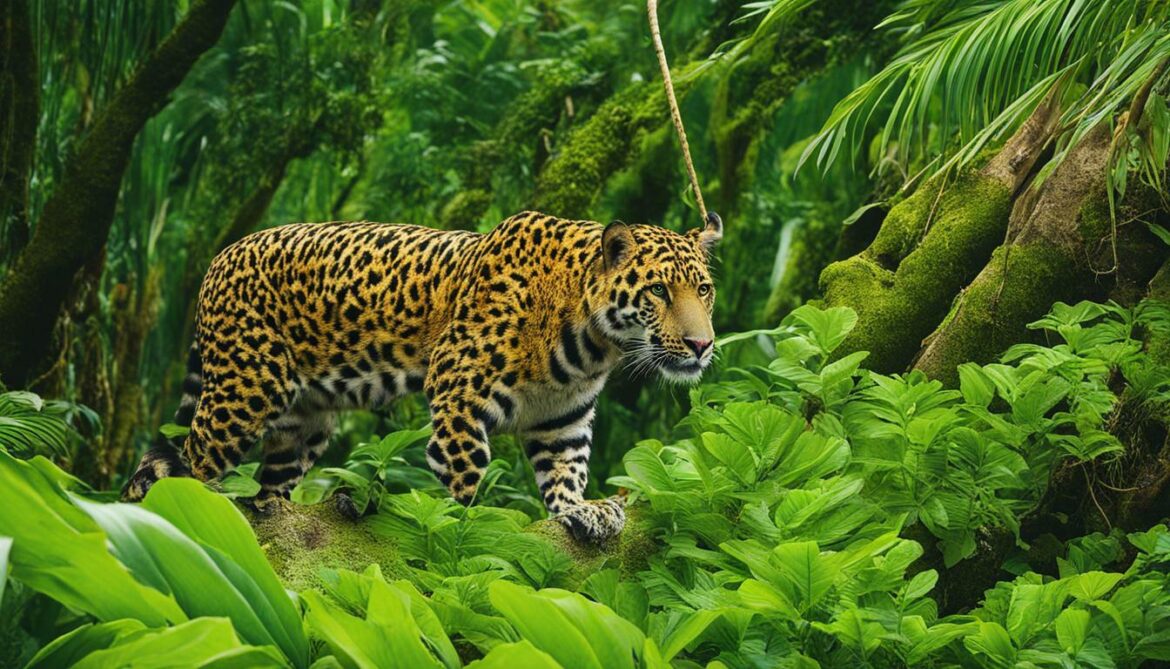
Brunei strives to leverage its biological resources as a foundation for sustainable economic growth and reduce reliance on the oil and gas industry. With its rich biodiversity and diverse ecosystems, Brunei has tremendous potential to harness the benefits of its natural resources while ensuring long-term environmental sustainability.
The country’s lush rainforests, mangroves, and coral reefs provide a plethora of opportunities for sustainable development. By promoting responsible and ethical practices, Brunei can capitalize on its biological resources in a way that preserves its unique flora and fauna for future generations.
One of the key strategies in utilizing biological resources for sustainable growth is through eco-tourism. Brunei’s breathtaking natural landscapes, from the pristine rainforests to the vibrant coral reefs, offer a wealth of attractions for visitors seeking an immersive and sustainable travel experience. By promoting eco-friendly tourism practices and supporting local communities, Brunei can generate revenue while protecting its natural heritage.
| Benefits of Utilizing Biological Resources for Sustainable Growth |
Examples |
| Preserves biodiversity |
Establishing protected areas and conservation programs |
| Creates employment opportunities |
Developing eco-tourism and sustainable agriculture projects |
| Promotes research and innovation |
Investing in biotechnology and natural product development |
| Enhances sustainable development |
Implementing sustainable forestry and fisheries practices |
By integrating sustainable practices into industries such as forestry and fisheries, Brunei can ensure the responsible management of its biological resources. This includes adopting sustainable harvesting techniques, promoting the use of renewable energy sources, and investing in research and innovative solutions for sustainable agriculture.
Ultimately, Brunei’s commitment to utilizing its biological resources for sustainable growth not only benefits the economy but also safeguards the country’s rich biodiversity. Through careful planning, collaboration with local communities, and responsible resource management, Brunei can strike a balance between economic development and environmental conservation.
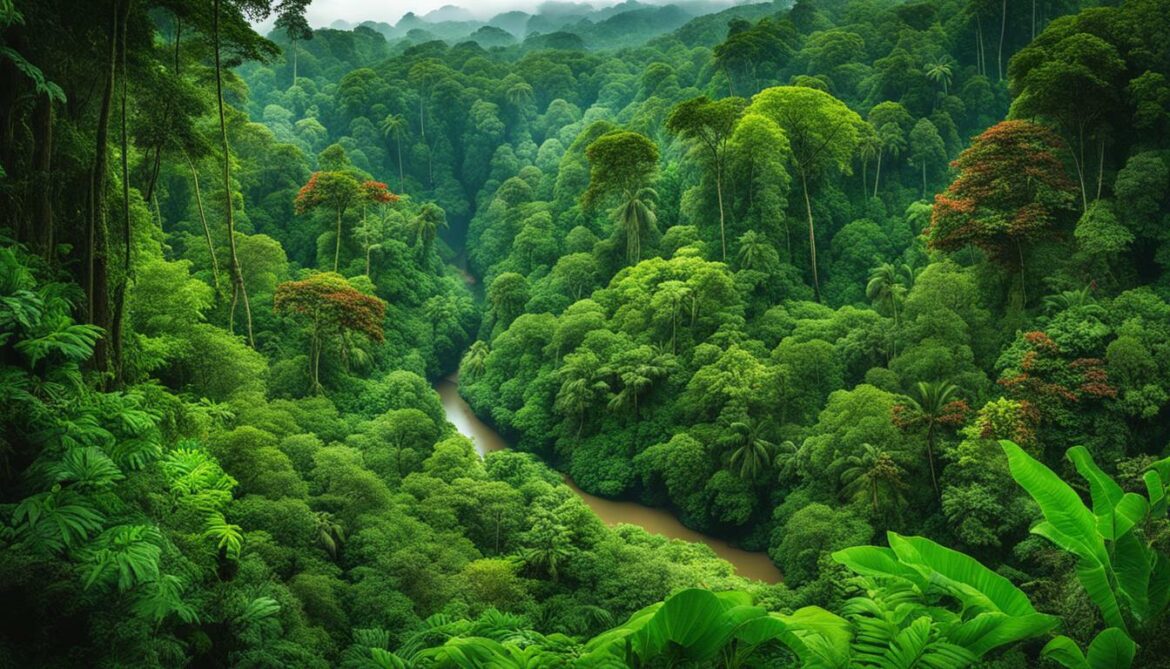
Brunei’s rich biodiversity is a true treasure that requires ongoing conservation efforts to protect and preserve for future generations. Situated on the northwest coast of Borneo, this small country boasts an incredible diversity of ecosystems, including tropical evergreen rainforests, mangroves, coral reefs, and peat swamp forests. Within these habitats, Brunei is home to an estimated 15,000 species of vascular plants and 2,000 species of trees.
One of Brunei’s unique features is its endemic species, which can only be found within its borders. These include the charismatic proboscis monkey and the ground squirrel. The country is also home to two crocodile species and diverse freshwater species.
Unfortunately, Brunei’s biodiversity is facing numerous threats. Land development, pollution, encroachment, climate change, and invasive alien species are all putting immense pressure on these fragile ecosystems. Additionally, human activities such as unsustainable harvesting and poaching are contributing to the loss of biodiversity. Development projects and forest fires further endanger the unique natural environments found in Brunei.
However, there is hope. Brunei is actively implementing conservation measures to protect and conserve its biodiversity. Forest reserves and marine protected areas have been established to preserve key habitats. The government is also enacting the National Biodiversity Strategy and Action Plan, demonstrating its commitment to achieving the 2020 Aichi Biodiversity Targets.
Awareness-raising initiatives, cooperation with local communities, and the integration of biodiversity conservation into national development plans are key components of Brunei’s conservation efforts. By utilizing its biological resources for sustainable economic growth, the country is striving to reduce its reliance on the oil and gas industry while safeguarding its natural heritage.
Brunei’s rich biodiversity is not only an invaluable asset in terms of ecological stability but also a source of wonder and inspiration. By continuing to prioritize conservation, Brunei can ensure that its natural treasures endure for generations to come.
FAQ
What is the rich biodiversity of Brunei?
Brunei is known for its diverse ecosystem, including tropical evergreen rainforests, mangroves, coral reefs, and peat swamp forests. It is home to an estimated 15,000 species of vascular plants and 2,000 species of trees.
What are some endemic species found in Brunei?
Brunei is home to unique endemic species such as the proboscis monkey and the ground squirrel. It also has two species of crocodiles and diverse freshwater species.
What are the threats to Brunei’s biodiversity?
Brunei’s biodiversity is under threat from land development, pollution, encroachment, climate change, and invasive alien species. These factors contribute to the loss of biodiversity in the country.
How do human activities impact biodiversity in Brunei?
Unsustainable harvesting and poaching are among the human activities that contribute to biodiversity loss in Brunei. Development projects and forest fires also endanger unique natural environments.
Are there any efforts to protect and conserve biodiversity in Brunei?
Yes, Brunei has established forest reserves and marine protected areas to protect and conserve biodiversity. The government is also implementing the National Biodiversity Strategy and Action Plan and working towards the 2020 Aichi Biodiversity Targets.
How is biodiversity conservation integrated into national development plans in Brunei?
Brunei is actively integrating biodiversity conservation into its national development plans. This ensures that conservation efforts are considered and prioritized in the country’s overall development strategy.
What is the aim of Brunei in utilizing its biological resources?
Brunei aims to utilize its biological resources for sustainable economic growth. This includes reducing reliance on the oil and gas industry and finding ways to harness the potential of its diverse flora and fauna in a sustainable and responsible manner.
Source Links
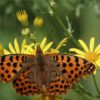
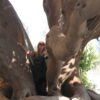
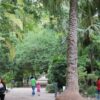



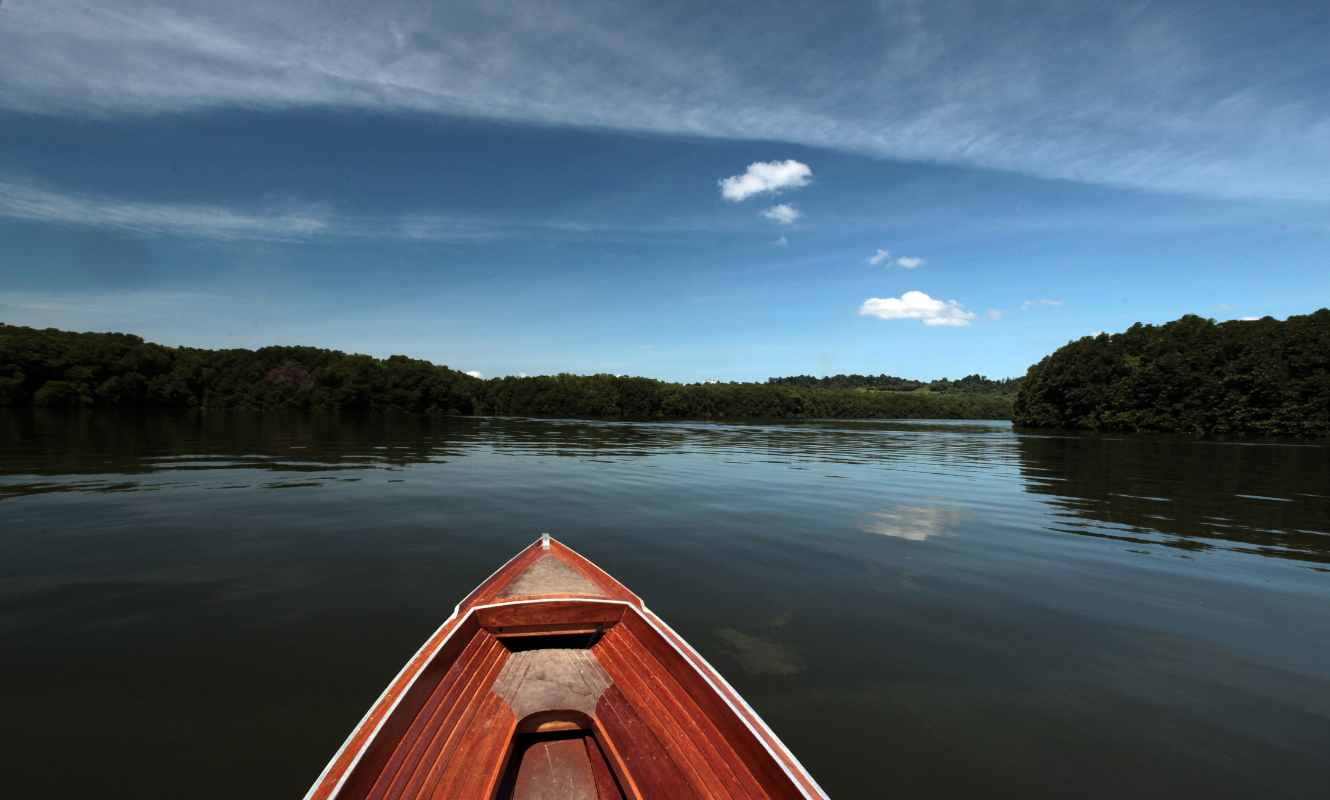









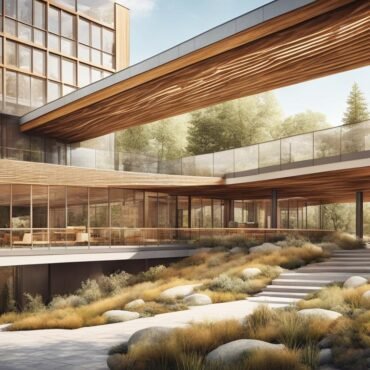
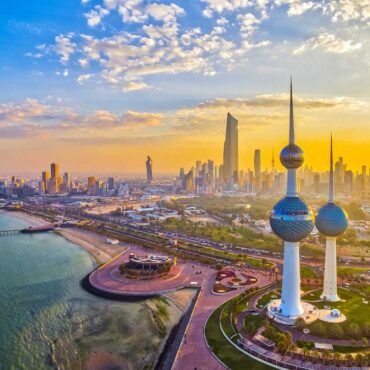






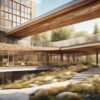


Post comments (0)